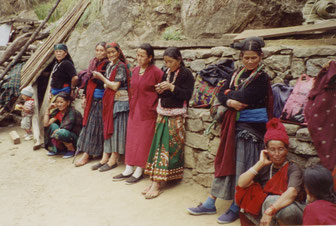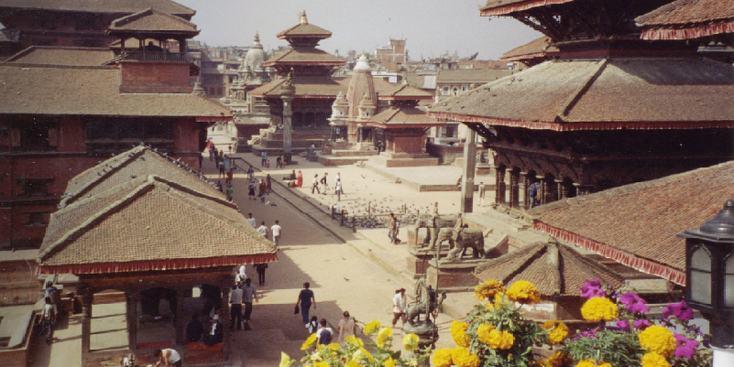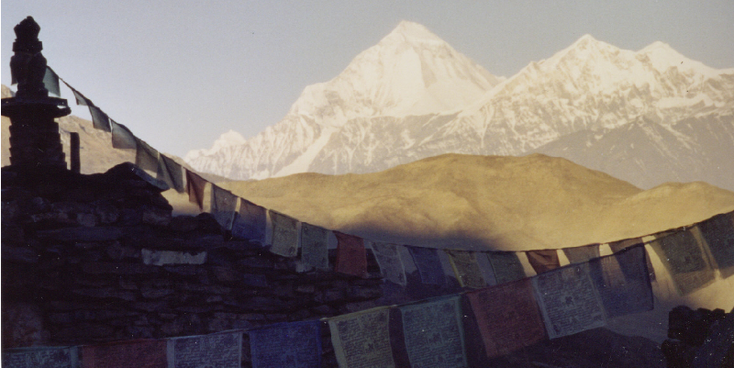NEPAL

Official name : Federal Democratic Republic of Nepal
Capital : Kathmandu
Currency : Nepali Rupi (NPR)
Language : Nepali
Inhabitants : 30.000.000
Visa required : YES
introduction

Many people in Nepal in cities and in the countryside are extremely poor, more than half of the population lives below the poverty line. Agriculture is the most important sector of the economy, providing work for almost 80% of the population. The industry mainly processes agricultural products such as jute, sugar cane, tobacco and grain. The production of textiles and carpets is experiencing rapid growth.
Tourism is also an important source of income for the country. The tourists are mainly drawn by the relative unspoiltness nature of the country and the Himalayas. Because the country is so dependent on tourism, the political situation has a direct impact on the prosperity of the country. The Maoists, supporters of the communist teachings of the Chinese ex-leader Mao Zedong, laid down their weapons in 2006 after years of civil-war. The struggle, aimed at the abolition of the monarchy and the establishment of a socialist state of salvation, demanded more than 13,000 lives.
In Nepal there has been general agreement for a long time about the abolition of the royal family, but the parties disagreed about how the monarchy should be ended. Gyanendra came to the throne in June 2001 after an unprecedented bloody drama in the palace. The then crown prince Dipendra, reportedly under the influence of alcohol and drugs, shot his parents - King Birendra and Queen Aishwarya - and seven other 'royals' deaths. Then he committed suicide. What exactly was going on has never become clear. The crown prince would have argued with his parents about his choice of partner. Gyanendra was the only remaining heir to the throne. The arrival of the current king after the drama sharpens the relations in Nepal. Many Nepalese lost their confidence in the royal family and that was what the Maoists played. The Kingdom of Nepal has now changed into a federal republic where the king has no official political control.
Despite this big change, the political situation remains unstable and there are still demonstrations and riots of groups of Nepali who want more independence. This is the case, for example, with the Madeshis in Terai and the Limbus in the east. As a Westerner, it is mainly the so called "closed" regions where you are not allowed to come and the many roadblocks. Small-scale attacks sometimes occur in the Terai region and in Kathmandu. Behind the attacks are small splinter groups of Hindu extremists and activists in the Terai.
Terrorist violence can also occur on the part of the Maoists, even though this has been greatly reduced since the Kingdom was abolished. On 25 April 2015, a heavy earthquake occurred in Nepal. The epicenter of the quake lay at the place Gorkha, between Kathmandu and Pokhara. Another powerful earthquake, followed by a number of strong aftershocks, took place on 12 May 2015. Nepal is frequently hit by earthquakes, landslides, floods and other natural disasters. People are also often attacked by wild animals such as tigers, leopards and elephants in search of new habitat. Finally, it happens regularly that people (including tourists) perish or are injured because their means of transport drops into ravines or car-accidents.
read more about nepal:
LANDEN:
EUROPA:
Albanië * België * Bosnië-Herzegovina * Bulgarije * Denemarken * Duitsland * Engeland * Estland * Finland * Frankrijk * Griekenland * Hongarije * (Noord) Ierland * Italië * Kosovo * Kroatië * Letland * Litouwen * Luxemburg * Macedonië * Malta * Montenegro * NEDERLAND * Oekraïne * Oostenrijk * Polen * Portugal * Roemenië * Rusland * Schotland * Servië * Slovenië * Slowakije * Spanje * Tsjechië * Turkije * Zweden
NOORD EN CENTRAAL-AMERIKA:
Chili * Costa Rica * Cuba * Guatemala * Mexico * Nicaragua * Panama * Verenigde Staten
ZUID-AMERIKA:
Argentinië * Bolivia * Brazilië * Colombia * Ecuador * Peru
AFRIKA:
Botswana * Burkina Faso * Egypte * Ethiopië * Ghana * Kenia * Mali * Marokko * Namibië * Oeganda * Senegal * Tanzania * Tunesië * Zuid-Afrika
MIDDEN-OOSTEN:
Iran * Israël * Jordanië * V.A.E.
AZIE:
Armenië * Cambodja * China * Filipijnen * Georgië * India * Indonesië * Japan * Kirgizië * Laos * Maleisië * Mongolië * Myanmar * Nepal * Oezbekistan * Singapore * Sri Lanka * Thailand * Vietnam
OCEANIE:
Voor meer reisfoto's kijk op www.instagram.com/cheapskatetravel.nl:
© Cheapskatetravel.nl; 2018 (all rights reserved)






